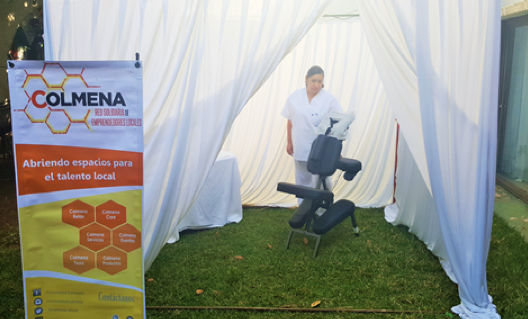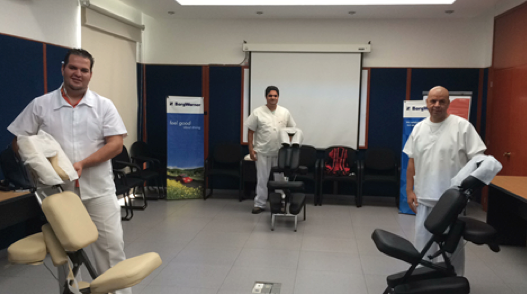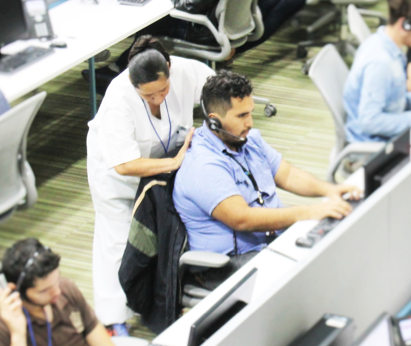Summary
In Mexico, 94 percent of economic units are micro business. They employ nearly 42 percent of working people in this country (INEGI, 2011). Although they have relevance for economic and social activities, this segment of companies contributes only eight percent of national GDP (INEGI, 2011), which shows its low productivity. This has an impact on micro entrepreneurs, but also on labor conditions and the quality of life of an interconnected system of people, families, and communities linked to the micro productive sector, either in their formal or informal capacity.
For more than a decade, Mexico has met the challenge of boosting micro businesses’ competitiveness, by including them in the public agenda, at the federal and local level. However, implemented public policies have been focused on capacity building, technical assistance, and financing access (micro-credits and subsidies). This shows the importance of the attention and investment of resources given to the issue; an example of this is the creation of the National Fund for Entrepreneurs in 2013. However, there is a lack of research on the effectiveness and impact of profitability improvement, employment, or business survival (CONEVAL, 2013). Also, empirically, some designs and execution failures were detected on such programs, compared to evidence showed in systematization and meta-analysis studies of similar policies and programs developed in comparable international environments.
Making an international public policy design comparison regarding incentives for competitiveness of micro, small, and medium size businesses (MiPyMes for its Spanish acronym), internationally, some design failures found in Mexican policies are:
- Programs addressing the problem are limited. On one hand, regarding capacity building, actual programs are focused only on lack of technical skills in entrepreneurs. Those programs do not consider the need for entrepreneurs to develop soft skills, so they could improve their businesses, develop products, and access potential markets.
- Regarding capital access for creation, consolidation, and growth of business, currently this issue is targeted only from access to working capital. Financial exclusion is not considered at all, even though it is one of the root causes for this problem. Also, there is no approach to scarce capacities found in micro, small, and medium sized business for financial management; neither is there an approach for structural factors that cause inaccessibility to capital at competitive costs for growth.
- Ecosystem perspective and context at a macro level have been one of the fundamental aspects that has not been considered by competitive public policies in Mexico oriented to MiPyMes, even though these factors are shown to be relevant by successful evidence-based programs. Some studies related to contributing factors for businesses’ low competitiveness in Mexico confirms that entrepreneurs have serious market access limitations. According to those studies, that limited access is due to products and services not aligned to market needs, including poor innovation or added value. Other factors are scarce productive capacity and high production costs, which have influence in less competitive conditions for small and medium sized businesses versus bigger companies. In addition, public policies and programs are not focused on training and strengthening entrepreneurs, so they would be empowered to respond to actual market trends and requests.
- Also, actual public policies are unlinked. This means that micro, small, and medium size businesses have limitations when competing with bigger businesses that are superior in production capacity, negotiation margins, and financing. In this sense, it is known that policies that promote the development of clusters or productive chains have better individual and collective results.
Comunidad Colmena -- The Hive Community
Having this knowledge and understanding of the complexity of the problem that surrounds MiPyMes in Mexico, in 2015 a social business “Comunidad Colmena, Red de Emprendedores Sociales,” the hive community -- social entrepreneur network (Colmena), was born. Colmena’s objective is to boost profitability of MiPyMes, through development of services and products and through linking new businesses and profitable opportunities with solidary in the economy perspective.
Colmena builds alliances with social entrepreneurs with a specific profile: self-employed, micro-entrepreneurs, and non-governmental organizations (NGOs) that already have unique services and products, with a high linkage potential to competitive markets and value chains. From the personal and humanitarian point of view, Colmena’s associates have some vulnerability conditions such as being low-income or having scarce access to capital, limited support networks, and links to industry; also, those entrepreneurs who are geographically set apart from competitive markets, meaning structural exclusion, for the commercialization of their products and services.

Rosy Ready to start service in the garden of a company
Source: Adriana Jácome
Due to this situation, Colmena has identified and developed three kind of market niches:
Business to Business (B2B)
1. Companies that are searching for corporate social responsibility practices that includes small size producers, so the company can contribute to the wellbeing and development of their employees and the surrounding community.
2. Information technology companies and social businesses whose objectives and missions are based on the development of better environments that improve the wellbeing of their employees.
Business to Customer (B2C)
3. Lifestyles of Health and Sustainability (LOHAS) markets. This kind of market focuses on individual and society’s integral health and wellbeing. This market also is willing to pay full and real prices of products, due to the value of the workforce and natural resources used during the products’ life cycle (production, distribution, and final sale)
Colmena Relax: A Social Impact Innovation
One of the first business lines developed by Comunidad Colmena is called “Colmena Relax.” This business line includes the commercialization of massage services with a therapeutic scope. These massages are adapted to fit companies’ environments, mainly aimed at companies that care about their employees’ integral wellbeing and provides them with incentives.
Colmena Relax, as a social business, that began with Rosy, Fernando, Oscar, and Joel, all certified massage professionals and micro-entrepreneurs with the shared characteristic of having a highly developed tactile sensibility and being blind or visually impaired. When Colmena met them, it found a virtuous link: on one hand, companies’ need for giving innovative incentives to their employees and contributing to their integral wellbeing, and on the other hand, the potential talent and willingness for growth of those visually impaired masseurs.

Ready to provide services in a company
Source: Magdalena Rodríguez

Rosy giving a massage in a telemarketing company
Credit: Adriana Jácome
Due to this linkage, Colmena now provides massage services to companies. It offers massages developed with different kinds of short term therapy and relaxation techniques (shiatsu massages with a duration of 15 minutes, for example). These services seek to generate physical wellbeing feelings among a companies’ employees and contribute to better labor stress management.
It is also important to mention that Colmena identified some cultural challenges with the masseurs and some companies. On one side, masseurs needed to develop some quality criteria requested by the profile of the new kinds of consumers. These kinds of consumers have high expectations of the whole experience that surround the services, image, performance, and personal clothing of masseurs; in fact, these consumers request service standardization, such as strict duration of service, so a schedule is complied, usage for high quality supplies, etc. In order to solve it, over six months, Colmena worked with these visually impaired masseurs to develop service adaptations to meet the companies’ requests. Before the Colmena alliance, those masseurs used to offer their services in their own homes and their clients were limited to their own personal friends. Some of the improvements were focused on providing a better experience for customers by fomenting the use of high quality aromatic essences, wearing proper outfits for the service, and polishing their personal appearance.
Regarding the companies, one of the challenges faced by Colmena was to convince them to give incentives, this was disruptive within the incentive industry. Generally, incentives offered by companies to employees were products or vouchers for traditional services, (for instance, vouchers for food, eyeglasses, movies, or to buy home appliances). Another challenge was to work with companies to allow employees to have access to the massages themselves, by allowing them to have a break in their work. As a result of this, Colmena worked with the massage therapists to adapt the length of their work to the conditions asked for by the companies to keep the benefits of the massages. For instance, the telemarketing companies made some adjustments in the shiatsu massage to make it possible to perform this massage in a specific post office.
During its two years of operations, Colmena has acquired learned lessons to continuously improve the services offered according to its clients’ expectations, and above the standards of the market. The systems of planning and promotion of services have also been improved on potential markets, by Colmena having a better understanding of their needs.
Working with Colmena Relax allows massage therapists to get into other markets, increase their client portfolios, promote their services, and increase revenues. In addition, companies help to improve the welfare of their employees following social responsibility rules, including the promotion of a culture of labor and social inclusion of people with disabilities. Colmena also accomplishes its mission of connecting social entrepreneurs with opportunities of fair and sustainable trade based on the principles of an economy of solidarity.
Future Plans
So far, Comunidad Colmena has developed Colmena Relax and other social business lines, such as Colmena Events and Colmenta Products, using founders’ capital. In the short term, based on learned lessons during recent years and projection of increased business opportunities for the community of blind and visually impair masseurs, Colmena will promote the creation of a Therapeutic Center. This center will become a sales point, where massage services offered will be increased by providing long duration relaxing and therapeutic massages (i.e., 30 to 90 minutes). Furthermore, Colmena Therapeutic Center will provide sports and specialized therapy, for stress-related pathologies.
Social Impact
Colmena’s social impact so far is reflected, mainly, in the increase of the masseurs and other social entrepreneurs’ incomes. In addition, through Colmena’s coordination, blind and visually impaired masseurs have improved their previously small support community by expanding it which has improved their self-confidence. At the companies’ ambit, and as an anecdote, Colmena Relax’s users report that they not only receive an immediate improvement to their wellness when they receive a massage, but they are more aware of masseurs’ talent, which, even though they are visually disabled, the masseurs are able to make the most of their potential while they are integrated into society, functionally and productively.
Furthermore, Comunidad Colmena is generating a social impact on companies’ culture in Mexico. Colmena encourages social entrepreneurs’ learning and comprehension of other markets logic, which have not been accessible to them before. Also, social entrepreneurs have increased their productivity, learned to make adaptations to their services so they comply with market needs and demands, and also have learned to develop other crucial soft skills for the business world. At the same time, Comunidad Colmena is fomenting that companies become a vehicle for increasing social responsibility awareness, putting special emphasis on inclusion of people with disabilities. By doing this, Colmena is demonstrating that social entrepreneurs’ skills and talents, productivity, and the business sector can be articulated and together a better and more prosperous society can be built for the benefit of all.
Works Cited
Cintina, I., & Love, I. (2014). The Miracle of Microfinance Revisited: Evidence from Propensity Score Matching (No. 201424).
Consejo Nacional de Evaluación de la Política de Desarrollo. “Ficha de Monitoreo 2013 Fondo de Microfinanciamiento a Mujeres Rurales”. www.coneval.org.mx (consultada el 1º de mayo de 2018)
Banerjee, A., Duflo, E., Goldberg, N., Karlan, D., Osei, R., Parienté, W., ... & Udry, C. (2015). A multifaceted program causes lasting progress for the very poor: Evidence from six countries. Science, 348(6236), 1260799.
González, C. R. (2014). Can micro-finance help small farmers in developing countries improve their livelihoods? A Systematic Review.
INEGI (2011). Micro, pequeña, mediana y gran empresa : estratificación de los establecimientos : Censos Económicos 2009 / Instituto Nacional de Estadística y Geografía.-- México : INEGI, c2011.
INEGI (2014). Esperanza de vida de los negocios en México : metodología / Instituto Nacional de Estadística y Geografía.-- México : INEGI, c2014.: internet.contenidos.inegi.org.mx (consultada el 1º de mayo de 2018)
McKenzie, D., & Woodruff, C. (2013). What are we learning from business training and entrepreneurship evaluations around the developing world? The World Bank Research Observer, lkt007.
McPherson, M. A. (1996). Growth of micro and small enterprises in southern Africa. Journal of development economics, 48(2), 253-277.
Authors’ bios
Elena Valencia received a B.A. in International Business and Administration and majored in Social Development at the Universidad Panamericana in Guadalajara, Mexico. She was granted an Erasmus Mundus scholarship by the European Commission. She received her Master of Science degree with honours in Strategic Project Management by Heriot-Watt University, Politecnico di Milano and Umea Universitet (Edinburg, Scotland; Milan, Italy and Ümea, Sweden). Her professional experience has been built in companies, developing products, and directing international import and export operations. However, in the last eight years, she has been involved in social development. Elena was a public servant for five years for the local government and she previously was a university professor lecturing in public management. For the last three years, she has served as a specialized consultant in strategic planning.
Magdalena Rodríguez graduated with a master in Development Management from the London School of Economics and Political Science (LSE) with honors. She is also an industrial and systems engineer by ITESM Guadalajara, Mexico. Magdalena founded and directs consultancy businesses focused on development, sustainability, and corporate social responsibility, ProSociedad and ACCSE. Her professional experience is focused on the design and evaluation of projects and programs, strengthening of NGOs, social businesses, and companies, while being socially responsible and sustainable. In 2018, she was invited by the United States government as a Mexican representative to the International Visitors Leadership Program. In that program, Magdalena and other leaders shared best practices in corporate social responsibility. Due to her research on inter-sectoral alliances, in 2015 she was awarded second place in Civil Society Investigation Award, sponsored by the Mexican Center of Philanthropy (CEMEFI for it Spanish acronym). As an academic, she has collaborated at several universities in Mexico such as Universidad Panamericana, Tec de Monterrey, and ITESO with projects related to corporate social responsibility, social innovation, and international cooperation project management for development and solidary economy, among others.


